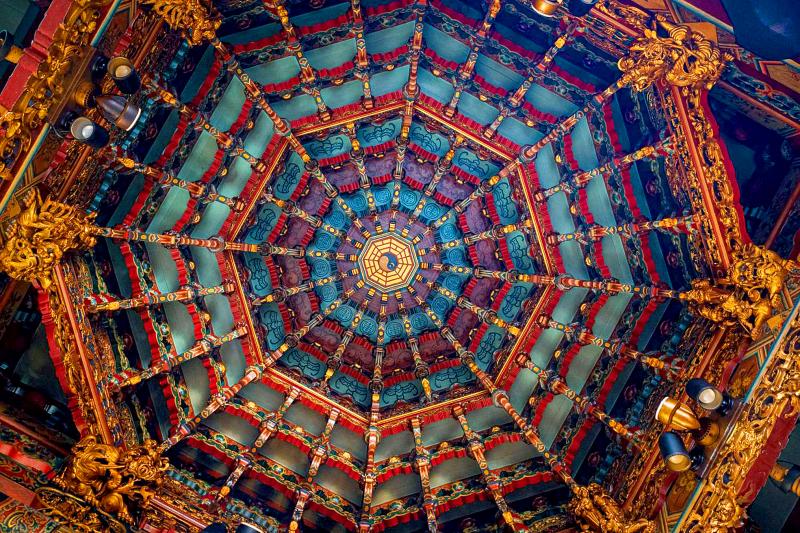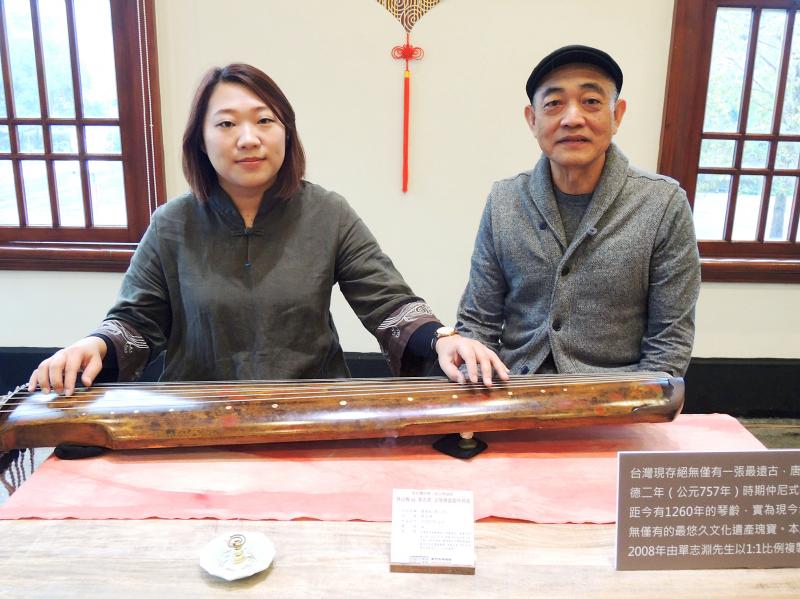Hsinchu’s traditional architectural painting and guqin (古琴) have been named intangible cultural assets, bringing the city’s total to six and marking the first time the instrument has been recognized by any region.
The guqin is China’s oldest musical instrument with a history dating back 3,000 years, the Hsinchu Cultural Affairs Bureau said last week.
Growing up in Hsinchu, Shan Chih-yuan (單志淵) began learning how to make traditional Chinese instruments at a very young age from his father, particularly stringed instruments such as the guqin and ruan (阮), the bureau said.

Photo courtesy of the Hsinchu City Government
For more than 40 years he has dedicated himself to the craft, following the ancient methods from the Tang and Song dynasties that have largely been lost, it said, adding that his preference is to make every component from scratch, rather than using manufactured parts.
The detailed and colorful paintings of Fu Pai-tsun (傅?村) have also been registered as intangible cultural assets in recognition of his more than 60 years decorating shrines and temples.
Fu uses traditional techniques accumulated through decades of experience, including creating his own brushes and putty, the bureau said.

Photo: Hung Mei-hsiu, Taipei Times
He is now one of the few people versed in these methods, which he intends to pass on to his two sons, the bureau added.
Aside from the two new additions, Lin Yao-nung (林瑤農) has also been recognized as a preserver of the art of glassblowing, which had previously been named an intangible cultural asset.
Lin, who last year was recognized as a national craftsman, has been creating works of art from glass for more than four decades, the bureau said.
Like the other preservers of culture, he uses traditional methods, including freehand blowing and molding of glass, it said.
As one of the few glassblowers left in the city, Lin is also passing his knowledge on to his children, as well as his students in the Hsinchu area, it added.
The other three intangible cultural assets listed in Hsinchu are woodcarving, lacquer art and mother-of-pearl inlays.

A decision to describe a Chinese Ministry of Foreign Affairs statement on Singapore’s Taiwan policy as “erroneous” was made because the city-state has its own “one China policy” and has not followed Beijing’s “one China principle,” Deputy Minister of Foreign Affairs Tien Chung-kwang (田中光) said yesterday. It has been a longstanding practice for the People’s Republic of China (PRC) to speak on other countries’ behalf concerning Taiwan, Tien said. The latest example was a statement issued by the PRC after a meeting between Singaporean Prime Minister Lawrence Wong (黃循財) and Chinese President Xi Jinping (習近平) on the sidelines of the APEC summit

Taiwan’s passport ranked 34th in the world, with access to 141 visa-free destinations, according to the latest update to the Henley Passport Index released today. The index put together by Henley & Partners ranks 199 passports globally based on the number of destinations holders can access without a visa out of 227, and is updated monthly. The 141 visa-free destinations for Taiwanese passport holders are a slight decrease from last year, when holders had access to 145 destinations. Botswana and Columbia are among the countries that have recently ended visa-free status for Taiwanese after “bowing to pressure from the Chinese government,” the Ministry

‘SIGN OF DANGER’: Beijing has never directly named Taiwanese leaders before, so China is saying that its actions are aimed at the DPP, a foundation official said National Security Bureau (NSB) Director-General Tsai Ming-yen (蔡明彥) yesterday accused Beijing of spreading propaganda, saying that Chinese President Xi Jinping (習近平) had singled out President William Lai (賴清德) in his meeting with US President Joe Biden when talking about those whose “true nature” seek Taiwanese independence. The Biden-Xi meeting took place on the sidelines of the APEC summit in Peru on Saturday. “If the US cares about maintaining peace across the Taiwan Strait, it is crucial that it sees clearly the true nature of Lai and the ruling Democratic Progressive Party (DPP) in seeking Taiwanese independence, handles the Taiwan question with extra

HEALTHCARE: Following a 2022 Constitutional Court ruling, Taiwanese traveling overseas for six months would no longer be able to suspend their insurance Measures allowing people to suspend National Health Insurance (NHI) services if they plan to leave the country for six months would be abolished starting Dec. 23, NHIA Director-General Shih Chung-liang (石崇良) said yesterday. The decision followed the Constitutional Court’s ruling in 2022 that the regulation was unconstitutional and that it would invalidate the regulation automatically unless the NHIA amended it to conform with the Constitution. The agency would amend the regulations to remove the articles and sections that allow the suspension of NHI services, and also introduce provisional clauses for those who suspended their NHI services before Dec. 23, Shih said. According to